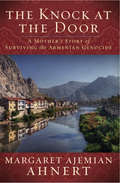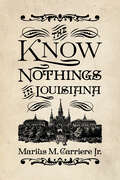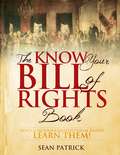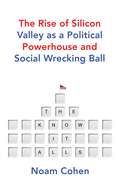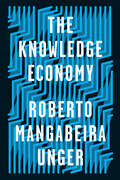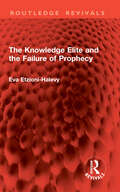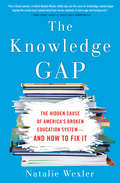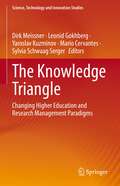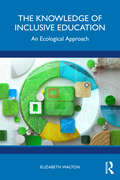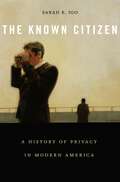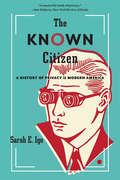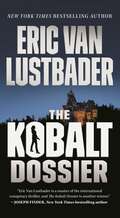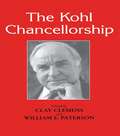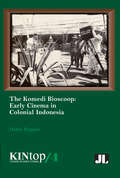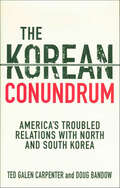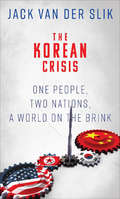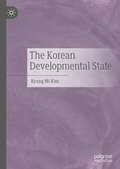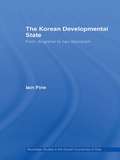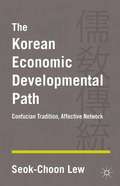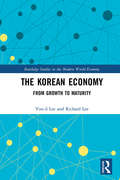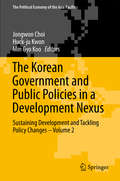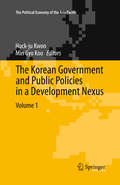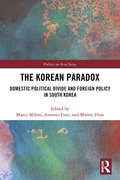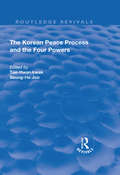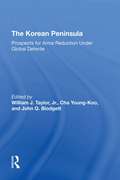- Table View
- List View
The Knock at the Door: A Mother's Survival of the Armenian Genocide
by Margaret AhnertIn 1915, Armenian Christians in Turkey were forced to convert to Islam, barred from speaking their language, and often driven out of their homes as the Turkish army embarked on a widespread campaign of intimidation and murder. In this riveting book, Margaret Ajemian Ahnert relates her mother Ester's terrifying experiences as a young woman during this period of hatred and brutality. At age 15, Ester was separated from her family during a forced march away from her birth town of Amasia. Though she faced unspeakable horrors at the hands of many she met, and was forced into an abusive marriage against her will, she never lost her faith, quick wit, or ability to see the good in people. Eventually she escaped and emigrated to America. Ahnert's compelling account of her mother's suffering is framed by an intimate portrait of her relationship with her 98-year-old mother. Ester's inspiring stories, told lovingly by her daughter, will give you a window into the harrowing struggle of Armenians during a terrible period in human history.
The Know Nothings in Louisiana
by Marius M. Carriere Jr.In the 1850s, a startling new political party appeared on the American scene. Both its members and its critics called the new party by various names, but to most it was known as the Know Nothing Party. It reignited political fires over nativism and anti-immigration sentiments. At a time of political uncertainty, with the Whig party on the verge of collapse, the Know Nothings seemed destined to replace them and perhaps become a political fixture.Historian Marius M. Carriere Jr. tracks the rise and fall of the Know Nothing movement in Louisiana, outlining not only the history of the party as it is usually known, but also explaining how the party's unique permeation in Louisiana contrasted with the Know Nothings' expansion nationally and elsewhere in the South. For example, many Roman Catholics in the state joined the Know Nothings, even though the party was nationally known as anti-Catholic.While historians have largely concentrated on the Know Nothings' success in the North, Carriere furnishes a new context for the evolution of a national political movement at odds with its Louisiana constituents. Through statistics on various elections and demographics of Louisiana politicians, Carriere forms a detailed account of Louisiana's Know Nothing Party. The national and rapidly changing Louisiana political landscape yielded surprising, credible leverage for the Know Nothing movement. Slavery, Carriere argues, also played a crucial difference between southern and northern Know Nothing ideals. Carriere delineates the eventual downfall of the Know Nothing Party, while offering new perspectives on a nativist movement, which has appeared once again in a changing, divided country.
The Know Your Bill of Rights Book
by Michael MatthewsThis book helps you easily reach a deep understanding of the Bill of Rights by walking you through each amendment, clarifying the precise definitions of key words; providing the historical context you need to fully grasp and spirit and importance of the amendments; sharing powerfully insightful quotes on each amendment, straight from the Founders and their peers; supplying you with an extensive glossary of terms so you never get lost in a dictionary or encyclopedia trying to understand what you're reading; and more.
The Know-It-Alls: The Rise of Silicon Valley as a Political Powerhouse and Social Wrecking Ball
by Noam CohenThe world&’s tech giants are at the centre of controversies over fake news, free speech and hate speech on platforms where influence is bought and sold. Yet, at the outset, almost everyone thought the internet would be a positive, democratic force, a space where knowledge could be freely shared to enable everyone to make better-informed decisions. How did it all go so wrong? Noam Cohen reports on the tech libertarians of Silicon Valley, from the self-proclaimed geniuses Jeff Bezos, Peter Thiel, Reid Hoffman and Mark Zuckerberg to the early pioneers at Stanford University, who have not only made the internet what it is today but reshaped society in the process. It is the story of how the greed, bias and prejudice of one neighbourhood is fracturing the Western world.
The Knowledge Economy
by Roberto Mangabeira UngerRevolutionary account of the transformative potential of the knowledge economyAdam Smith and Karl Marx recognized that the best way to understand the economy is to study the most advanced practice of production. Today that practice is no longer conventional manufacturing: it is the radically innovative vanguard known as the knowledge economy. In every part of the production system it remains a fringe excluding the vast majority of workers and businesses. This book explores the hidden nature of the knowledge economy and its possible futures.The confinement of the knowledge economy to these insular vanguards has become a driver of economic stagnation and inequality throughout the world. Traditional mass production has stopped working as a shortcut to economic growth. But the alternative—a deepened and socially inclusive form of the knowledge economy—continues to lie beyond reach in even the richest countries. The shape of contemporary politics on both the left and the right reflects a failure to come to terms with this dilemma and to overcome it.Unger explains the knowledge economy in the truncated and confined form that it has today and proposes the way to a knowledge economy for the many: changes not just in economic institutions but also in education, culture, and politics. Just as Smith and Marx did in their time, he uses an understanding of the most advanced practice of production to rethink both economics and the economy as a whole.
The Knowledge Elite and the Failure of Prophecy (Routledge Revivals)
by Eva Etzioni-HalevyFirst published in 1985, The Knowledge Elite and the Failure of Prophecy presents a demystification of the role of the Knowledge Elite, or the role many intellectuals have purported to play in modern, Western, society. The author debunks their role as self-proclaimed prophets in charge of foretelling (or ‘forecasting’ as it is more fashionably called) things to come and in charge of guiding society towards a better future – devised by themselves. Scholars who have converged on the idea of the ‘post-industrial’ society have argued that the theoretical knowledge provided by what they call the Knowledge Class has been more useful than ever in guiding society towards greater rationality, affluence, equity, and liberty. In contrast, this book presents the argument that it is precisely in these years that the benefits of the knowledge provided by intellectuals have petered out, that its dubious and even harmful effects have become more prominent, and that the knowledge provided by intellectuals has been instrumental in helping to bring about a more confused society – a society increasingly incapable of coping with its mounting problems.This is a book on intellectuals, for intellectuals, by an intellectual. It is a book of social commentary, critique, and polemic. It is designed not to please, but to challenge intellectuals and to provoke counter-critique and controversy.
The Knowledge Gap: The hidden cause of America's broken education system--and how to fix it
by Natalie WexlerThe untold story of the root cause of America's education crisis--and the seemingly endless cycle of multigenerational poverty.It was only after years within the education reform movement that Natalie Wexler stumbled across a hidden explanation for our country's frustrating lack of progress when it comes to providing every child with a quality education. The problem wasn't one of the usual scapegoats: lazy teachers, shoddy facilities, lack of accountability. It was something no one was talking about: the elementary school curriculum's intense focus on decontextualized reading comprehension "skills" at the expense of actual knowledge. In the tradition of Dale Russakoff's The Prize and Dana Goldstein's The Teacher Wars, Wexler brings together history, research, and compelling characters to pull back the curtain on this fundamental flaw in our education system--one that fellow reformers, journalists, and policymakers have long overlooked, and of which the general public, including many parents, remains unaware. But The Knowledge Gap isn't just a story of what schools have gotten so wrong--it also follows innovative educators who are in the process of shedding their deeply ingrained habits, and describes the rewards that have come along: students who are not only excited to learn but are also acquiring the knowledge and vocabulary that will enable them to succeed. If we truly want to fix our education system and unlock the potential of our neediest children, we have no choice but to pay attention.
The Knowledge Triangle: Changing Higher Education and Research Management Paradigms (Science, Technology and Innovation Studies)
by Leonid Gokhberg Dirk Meissner Yaroslav Kuzminov Mario Cervantes Sylvia Schwaag SergerThis book helps readers understand how universities position themselves in the innovation landscape and the implications for national policies. It provides a scholarly discussion and best practice–based insights to help answer questions like: To what extent do funding and governance policies support activities within the knowledge triangle? How should policies for universities be designed in countries with different industrial and higher education structures? Are there ways to effectively link universities with regional enterprises and social actors? And finally, what are the new institutional models and best practices for overcoming obstacles to interaction, collaboration, and co-creation?
The Knowledge of Inclusive Education: An Ecological Approach
by Elizabeth WaltonThe Knowledge of Inclusive Education is a paradigm-shifting exploration of inclusive education as a dynamic knowledge practice. The knowledge that underpins the practice is understood through the metaphor of an ecology, with valuable contributions from educators, researchers, parents, students, policymakers, and international organisations.By examining the knowledge of policy, research, teacher education, and activism, Elizabeth Walton constructs a future for inclusive education that affirms different material-discursive places, inquiry, and possibility and replaces traditional research hierarchies with a life-affirming ecology. Readers will gain a novel perspective on the knowledge/s of inclusive education across multiple interacting domains.With theoretical resources ranging from the work of Lorraine Code and Basil Bernstein to concepts from Legitimation Code Theory, Decolonial theory, and Posthumanism, this book offers a unique and innovative approach to the multiple perspectives and knowledges that inform inclusive education policy and practice. Its conceptual and empirical research draws from several international contexts, ensuring that The Knowledge of Inclusive Education will be of interest to educators, scholars, and advocates of inclusive education worldwide and valued by those willing to embrace collaborative new directions in inclusive teaching, learning, and research.
The Known Citizen: A History of Privacy in Modern America
by Sarah E. IgoEvery day Americans make decisions about their privacy: what to share, how much to expose to whom. Securing the boundary between private affairs and public identity has become a central task of citizenship. Sarah Igo pursues this elusive social value across the twentieth century, as individuals asked how they should be known by their own society.
The Known Citizen: A History of Privacy in Modern America
by Sarah E. IgoEvery day Americans make decisions about their privacy: what to share, how much to expose to whom. Securing the boundary between private affairs and public identity has become a central task of citizenship. Sarah Igo pursues this elusive social value across the twentieth century, as individuals asked how they should be known by their own society.
The Kobalt Dossier: An Evan Ryder Novel (Evan Ryder #2)
by Eric Van LustbaderEvan Ryder is back in The Kobalt Dossier, the stunning follow-up to The Nemesis Manifesto from New York Times bestselling author Eric Van Lustbader. After thwarting the violent, international, fascist syndicate known as Nemesis, Evan Ryder returns to Washington, D.C., to find her secret division of the DOD shut down and her deceased sister’s children missing. Now the target of a cabal of American billionaires who were among Nemesis’s supporters, Evan and her former boss, Ben Butler, must learn to work together as partners – and navigate their intricate past.Their search will take them from Istanbul to Odessa to an ancient church deep within the Carpathian Mountains of Romania. And all along the way, an unimaginable enemy stalks in the shadows, an adversary whose secretive past will upend Evan’s entire world and everything she holds dear.At the Publisher's request, this title is being sold without Digital Rights Management Software (DRM) applied.
The Kohl Chancellorship
by Clay Clemens William E. PatersonIn this volume, Helmut Kohl's leadership and legacy are assessed, and contributors analyse the chancellor's goals and governing style, including his part in promoting European integration; and his domestic political role vis a vis his own party, its main opponents and the public.
The Komedi Bioscoop: Early Cinema in Colonial Indonesia (KINtop #4)
by Dafna RuppinThis fascinating study of early cinema in the Netherlands Indies explores the influences of new media technology on colonial society.The Komedi Bioscoop traces the emergence of a local culture of movie-going in the Netherlands Indies (present-day Indonesia) from 1896 until 1914. It outlines the introduction of the new technology by independent touring exhibitors, the constitution of a market for moving picture shows, the embedding of moving picture exhibitions within the local popular entertainment scene, and the Dutch colonial authorities’ efforts to control film consumption and distribution.Dafna Ruppin focuses on the cinema as a social institution in which technology, race, and colonialism converged. In her illuminating study, moving picture venues in the Indies—ranging from canvas or bamboo tents to cinema palaces of brick and stone—are perceived as liminal spaces in which daily interactions across boundaries could occur within colonial Indonesia’s multi-ethnic and increasingly polarized colonial society.
The Korean Conundrum: America's Troubled Relations with North and South Korea
by Doug Bandow Ted Galen CarpenterThe US seems to be heading directly toward a confrontation with North Korea as Koreans in the south, and nations around the world, anxiously witness mounting tension. Carpenter and Bandow take a look at the twin crises now afflicting US policy in East Asia: the reemergence of North Korea's nuclear weapons program and the growing anti-American sentiment in South Korea. They question whether Washington's East Asia security strategy makes sense with the looming prospect of US troops stationed in South Korea becoming nuclear hostages. Carpenter and Bandow put forth the most provocative solution yet to this gnarled and dangerous situation.
The Korean Crisis: One People, Two Nations, a World on the Brink
by Jack Van Der SlikAn in-depth portrait of the two Koreas and their turbulent relationship—from the author of Eisenhower: A 20th Century Hero in War and Peace.After nearly 70 years of division between North and South Korea, the two nations have not yet achieved a peaceful settlement. Professor Emeritus Jack Van Der Slik&’s book provides a first person account of the incredible differences between the nations.The Korean Crisis: One People, Two Nations, an Uncertain Future follows the fate of the two Koreas. The first is a story of hard-earned success by the South Korean people. Although democracy did not come easily, it did accompany flourishing through market capitalism. The second, the fall of the Democratic People&’s Republic of Korea, began with early economic success then sank into a socialist dictatorship, stratifying the country&’s people into a small privileged elite supported by a poor and cheerless mass of disadvantaged workers. Despite the poverty and food insecurity suffered by the North Korean underclass, the ruling elite has formidably armed itself with nuclear weapons and a massive standing army.The Korean Crisis draws upon deep studies of democratization in South Korea and Van Der Slik&’s own travels throughout the Republic of Korea and Panmunjom—the heavily armed 38th parallel and the site of peace negotiations. Intensely researched, highly informative, and poignantly told, The Korean Crisis will educate the public about Korea and the dangers that exist there while shedding light on a possible catastrophic nuclear conflict between the two rival countries whose combatants are, in fact, one people.
The Korean Developmental State
by Kyung Mi KimThis book analyzes, from a historical comparative perspective, the Korean economic development model, the extent to which it has changed from its classical model, and what constitutes its changes and continuity. Unlike studies claims the dissolution of Korean developmentalism, the book holds that the Korean state maintains its characteristics of state-led capitalism despite significant changes in policies and instruments rather than converge toward an AngloSaxon-style free market system. It emphasizes that the continuity of state-led capitalism is compatible with institutional change. Some institutionalists insist that the continuity of Korean developmentalism is based on path dependency. In contrast, this book argues that Korean capitalism could sustain its state developmentalism by changes in policies and instruments to improve national industrial competitiveness in the changed context of international competition. This book will be of interest to East Asian scholars, comparative economists, and those curious about the future of the Korean peninsula.
The Korean Developmental State: From dirigisme to neo-liberalism (Routledge Studies in the Growth Economies of Asia #Vol. 73)
by Iain PirieThe Korean Developmental State is a comprehensive and up-to-date analysis of processes of state and economic restructuring in South Korea since the 1997 crisis. The book distinguishes itself from previous studies by consistently arguing that structural changes in the global political economy have played a crucial role in reshaping the Korean state’s own economic project. More precisely, Iain Pirie seeks to demonstrate how the Korean state increasingly adopted neo-liberal policies from the 1980s onwards as a rational response to the evolution of global economic structures; an evolution which has been driven by the continuous attempts of major global firms and leading capitalist states to overcome the chronic profitability problems that have dogged the core capitalist area since the late 1960s. The radical restructuring programme the Korean state initiated after the 1997 crisis must be understood as a logical conclusion to these earlier, more incremental, processes of reform it initiated almost two decades earlier. This book seeks to establish the neo-liberal character of the Korean state through a close analysis of key institutional and policy reforms, and serious engagement with more theoretical debates concerning the nature of the neo-liberal state itself. The Korean Developmental State offers a new perspective on the economic experience of Korea as a development model, one that emphasizes global trends and contradictions for Korea’s economic crisis and resulting transformation, and as such will be of significant interest to scholars of Korean studies and the Asian economy.
The Korean Economic Developmental Path
by Seok-Choon LewThis book defines the Korean development as the moral economy of growth derived from a synergy between strong state and strong society and argues that Confucian cultural orientation has played a critical role in the process.
The Korean Economy: From Growth to Maturity (Routledge Studies in the Modern World Economy)
by Richard Lee You-il LeeThe Korean Economy: From Growth to Maturity takes an in-depth, amalgamated look at the evolution of Korea’s globalization drive from the early 2000s (Kim Dae-jung regime, 1998–2003) to the present period (Park Geun-hye, 2013–2017). The book discusses the role of foreign companies on the sustainability of Korea’s economic growth, the relationship between the chaebol and the MNCs, the evolution of Korea's nation brand, and the role of the state in Korea’s new economic trajectory (globalization) since the 2000s. With data collected from fieldwork, the book provides both empirical and qualitative insights (economic, socio-cultural and political economic analysis) into the Korean political economy and would be a very useful reference to other emerging economies experiencing similar globalization paths.
The Korean Government and Public Policies in a Development Nexus
by Min Gyo Koo Huck-Ju Kwon Jongwon ChoiIn the postwar period, Korea's economic and social-political metamorphosis is a rare example of a successful transition from one of the world's poorest developing countries to a highly sophisticated industrial society--an experience which many developing countries are keen to emulate The change is particularly significant as Korea was able to reduce poverty and keep social inequality at a modest level during its rapid economic development. This volume analyzes the Korean transition in regards to the political and institutional foundation of its government and public policies The government of Korea single-mindedly carried out public policies to stimulate economic growth, but the government and public policies have themselves been affected and changed by the process The contention of this volume is that the transition of Korean society and the evolution of the Korean government are the results of two-way interactions In this context, the volume analyzes the way in which the dynamics of public administration were shaped within the Korean government and the kinds of public policies and instruments that were adopted to encourage this economic and social development This analysis will allow a more complete understanding of the economic and social transformation of Korea Surprisingly, there is a paucity of research on this aspect--a gap which this volume seeks to fill This volume shows that it is necessary to maintain consistency and coherence in government and public policy in order to achieve economic and social transformation, making it of interest to both scholars and policy-makers concerned with development in the Asia-Pacific.
The Korean Government and Public Policies in a Development Nexus, Volume 1
by Min Gyo Koo Huck-Ju KwonIn the postwar period, Korea's economic and social-political metamorphosis is a rare example of a successful transition from one of the world's poorest developing countries to a highly sophisticated industrial society--an experience which many developing countries are keen to emulate. The change is particularly significant as Korea was able to reduce poverty and keep social inequality at a modest level during its rapid economic development. This volume analyzes the Korean transition in regards to the political and institutional foundation of its government and public policies. The government of Korea single-mindedly carried out public policies to stimulate economic growth, but the government and public policies have themselves been affected and changed by the process. The contention of this volume is that the transition of Korean society and the evolution of the Korean government are the results of two-way interactions. In this context, the volume analyzes the way in which the dynamics of public administration were shaped within the Korean government and the kinds of public policies and instruments that were adopted to encourage this economic and social development. This analysis will allow a more complete understanding of the economic and social transformation of Korea. Surprisingly, there is a paucity of research on this aspect--a gap which this volume seeks to fill. This volume shows that it is necessary to maintain consistency and coherence in government and public policy in order to achieve economic and social transformation, making it of interest to both scholars and policy-makers concerned with development in the Asia-Pacific.
The Korean Paradox: Domestic Political Divide and Foreign Policy in South Korea (Politics in Asia)
by Matteo Dian Marco Milani Antonio FioriBringing together an international line up of contributors, this book examines South Korea’s foreign policy strategies designed to cope with the challenges of the post-Cold War regional order and the emergence of a "Korean paradox". Focusing on non-material factors in shaping the decision-making processes of primary actors, such as traditions, beliefs, and identities, this book begins by analysing the emergence of the "Asian Paradox" and explores how different political traditions have influenced South Korea’s foreign and security policies. In the second part (from Chapter 4), this book goes on to deal directly with the key issues in South Korea’s foreign policy today, with an emphasis on the progressive and conservative approaches to the challenges the country faces. This includes the North Korean threat, the alliance with the U.S., relations with China and Russia, the complicated relationship with Japan, and the emerging role of South Korea outside of Northeast Asia. An innovative study of the domestic sources of South Korean foreign policy, The Korean Paradox investigates South Korea’s growing role at both regional and global levels. As such, it will be useful to students and scholars of Korean Studies, International Relations and East Asian Studies more generally.
The Korean Peace Process and the Four Powers
by Tae-Hwan KwakThis title was first published in 2003. After the inter-Korean Summit in 2000, the Korean peace process gained a new momentum and the two Koreas increased mutual contacts and exchanges. However, in 2001 the peace process stalled and was further hindered by Bush's hard-line policy towards Pyongyang and North Korea's inflexible attitudes towards Seoul. Interest in the Korean peninsula by the US, Russia, Japan and China, for geo-strategic and geo-economic reasons means that peace and unification will inevitably become an international problem. Against this backdrop, this original volume deals with the problems and prospects of the inter-Korean peace process and the interests, attitudes and policies of these major powers.
The Korean Peninsula: Prospects For Arms Reduction Under Global Detente
by Young Koo Cha John Q Blodgett Cha Young-Koo William J Taylor JrThis book addresses the issue that is whether the new Eas and West atmosphere of detente and arms reduction can smother the sparks of conflict on the Korean peninsula and perhaps illuminate the path to a Korea reunified as a democratic state.
